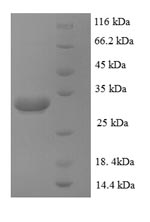Recombinant Human Zinc transporter ZIP1 (SLC39A1) , partial
CAT:
399-CSB-EP885760HU-02
Size:
100 µg
Price:
Ask
- Availability: 24/48H Stock Items & 2 to 6 Weeks non Stock Items.
- Dry Ice Shipment: No




Recombinant Human Zinc transporter ZIP1 (SLC39A1) , partial
- CAS Number: 9000-83-3
- Gene Name: SLC39A1
- UniProt: Q9NY26
- Expression Region: 126-179aa
- Organism: Homo sapiens
- Target Sequence: MEQITLAYKEQSGPSPLEETRALLGTVNGGPQHWHDGPGVPQASGAPATPSALR
- Tag: N-terminal GST-tagged
- Source: E.coli
- Field of Research: Transport
- Assay Type: Developed Protein
- Relevance: Mediates zinc uptake. May function as a major endogenous zinc uptake transporter in many cells of the body. Responsible for the rapid uptake and accumulation of physiologically effective zinc in prostate cells.
- Purity: Greater than 90% as determined by SDS-PAGE.
- Activity: Not Test
- Length: Cytoplasmic Domain
- Form: Liquid or Lyophilized powder
- Buffer: If the delivery form is liquid, the default storage buffer is Tris/PBS-based buffer, 5%-50% glycerol. If the delivery form is lyophilized powder, the buffer before lyophilization is Tris/PBS-based buffer, 6% Trehalose, pH 8.0.
- Reconstitution: We recommend that this vial be briefly centrifuged prior to opening to bring the contents to the bottom. Please reconstitute protein in deionized sterile water to a concentration of 0.1-1.0 mg/mL.We recommend to add 5-50% of glycerol (final concentration) and aliquot for long-term storage at -20℃/-80℃. Our default final concentration of glycerol is 50%. Customers could use it as reference.
- Function: Mediates zinc uptake. May function as a major endogenous zinc uptake transporter in many cells of the body. Responsible for the rapid uptake and accumulation of physiologically effective zinc in prostate cells.
- Molecular Weight: 33.1 kDa
- References & Citations: Identification of novel human genes evolutionarily conserved in Caenorhabditis elegans by comparative proteomics.Lai C.-H., Chou C.-Y., Ch'ang L.-Y., Liu C.-S., Lin W.-C.Genome Res. 10:703-713 (2000)
- Storage Conditions: The shelf life is related to many factors, storage state, buffer ingredients, storage temperature and the stability of the protein itself. Generally, the shelf life of liquid form is 6 months at -20℃/-80℃. The shelf life of lyophilized form is 12 months at -20℃/-80℃.
